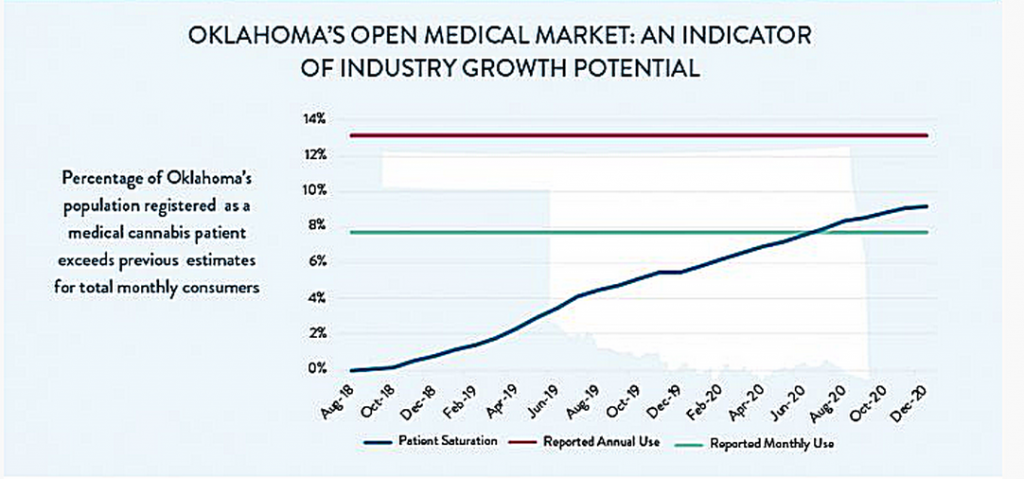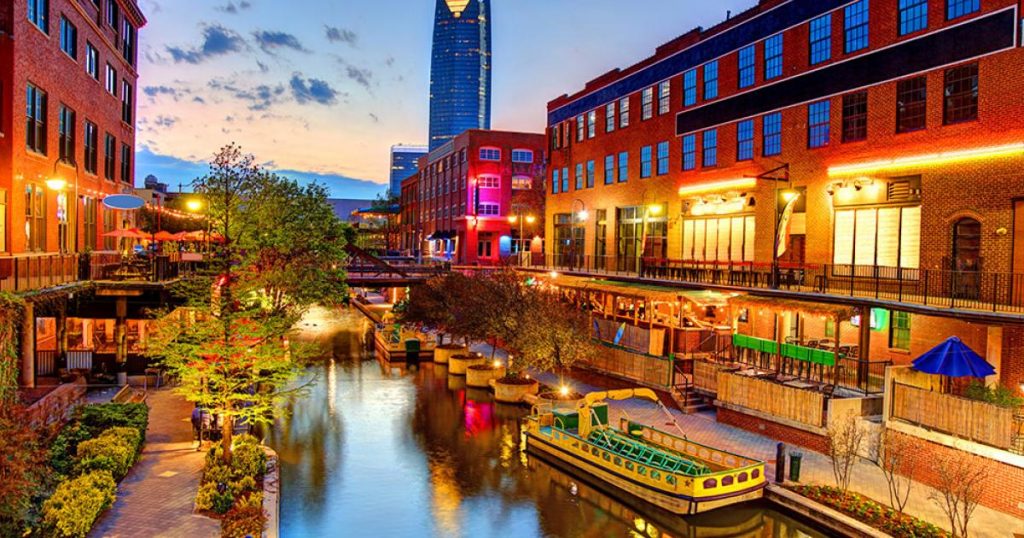Oklahoma, which has only had a medical program since 2018 managed to implement it with hyper speed.
After only 2 months, registration began for patients, doctors and medical cannabis businesses. Sales of product began one month later, making Oklahoma the fastest state to implement a medical program ever.
Despite conservative politics (Trump carried the state with 63% of the vote), this state has one of the most liberal programs in the country.
Delivery is not yet legal, which may have suppressed sales during the pandemic. However, licensed medical marijuana patients and caregivers can possess and grow limited amounts of cannabis and to purchase cannabis from regulated businesses.
Liberal Cannabis Policy in a Conservative State
Patients and caregivers with a medical card may possess up to:
- three ounces of cannabis on their person (eight ounces at their residence).
- one ounce of concentrates.
- 72 ounces of edibles; and
- six mature medical marijuana plants and up to six seedlings.
In addition, localities (cities and counties) may enact guidelines to allow patients and caregivers to exceed these limits without preemption.
This may be the most liberal regulated policy in the nation. Oklahoma does not require qualifying conditions for medical recommendations, which effectively permits any board-certified physician in good standing to recommend cannabis to a patient for any reason according to “accepted standards a reasonable and prudent physician would follow when recommending or approving any medication.”
In a program only 2 years old, the program has already reached its anticipated saturation point. They now have 340,000 registered patients, which is over 11% of the population of the state. They also have over 9,400 medical cannabis businesses. In fact, Oklahoma has more licensed cannabis retailers per resident than any other state (including those with both active medical and adult-use markets). The state’s surging number of cannabis business licenses is a function both of no statewide cap, and charging a relatively low licensing fee. In comparison, Florida now has 450,000 in their 4-year-old program. That is just over 2%, and has a little over 2000 cannabis physicians and 22 licenses, accounting for only 300 dispensary locations.

Oklahoma Legislators overwhelming pass new policies, but Governor vetoes – for now
Their legislature overwhelmingly passed a glitch bill in 2020 with bipartisan support, but it was vetoed at the last minute by Gov. Stitt. Among other things, it allows for delivery, and allows out-of-state visitors to apply for a renewable 3-month medical care, regardless of whether they have a medical card in their state or not and revised a statute to let any first-time marijuana possession conviction be punishable by a fine and no jail time.
However, in his veto message, Stitt wrote, “HB 3228 is a lengthy bill that alters Oklahoma’s medical marijuana program”. He also wrote, “language in the bill makes substantial policy changes to the medical marijuana program that were not fully scrutinized through normal legislative procedures before the bill was received by my office in the middle of the night Saturday.” He continued, “While there is much room for improvement in the way our state’s program operates, this bill does not address those items in a way I can support,” he said.
He did not state what policy in particular where he had issues. However you can be assured that legislators will be meeting with him in the hiatus between sessions to reintroduce the bill when the next legislative session starts.
2020 Ballot measure has setback in Supreme Court, but vows to return.
Also, a ballot measure to move to an Adult use program was declined as invalid by the State Supreme Court. They claimed that the wording of the petition was misleading, and people who signed the petition were not getting enough information to make an informed decision. That is a common issue with supreme courts who invalidate petitions for ballot measures, but plans are underway to correct the wording and resubmit.
But even with these setbacks, Oklahoma is still an amazing medical program with great potential.
In September, the Oklahoma Medical Marijuana Authority reported that the program has generated over $45 million in state and local taxes from medical marijuana sales so far in 2020. This already far outpaced the $30 million collected in 2019. Sales tax is capped at 7%.

Consumption Lounges could be there soon.
One of the exciting prospects of the law is that it does not prohibit consumption lounges, instead, it notes:
“All smokable, vaporized, vapable and e-cigarette medical marijuana and medical marijuana products smoked by a patient license holder are subject to the same restrictions for tobacco under Section1-1521 et. seq. of Title 63 of Oklahoma statutes, commonly referred to as the “Smoking in Public Places and Indoor Workplaces Act.”’
That bill restricts indoor smoking, but also notes:
“The restrictions provided in this section shall not apply to stand-alone bars, stand-alone taverns and cigar bars as defined in Section 1-1522 of Title 63 of the Oklahoma Statutes.” The definition states “”Stand-alone bar”, “stand-alone tavern”, and “cigar bar” mean an establishment that derives more than sixty percent (60%) of its gross receipts, subject to verification by competent authority, from the sale of alcoholic beverages and low-point beer and no person under twenty-one (21) years of age is admitted.”
That means that the Sooner State may have consumption lounges sooner then other parts of the country. This is a state that has a robust medical program with the potential to be a destination of out-of-state visitors.
And Bud’s Place will be ahead of the game, as the first IFA-approved franchise for “High, Quality. Fun” and a solid business opportunity.
You’re doing fine, Oklahoma. See you there.




